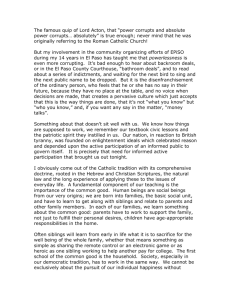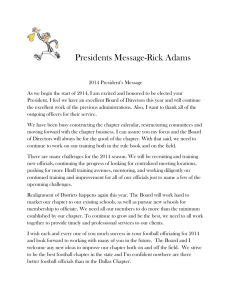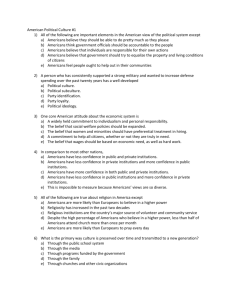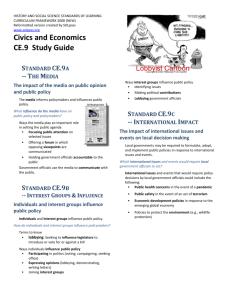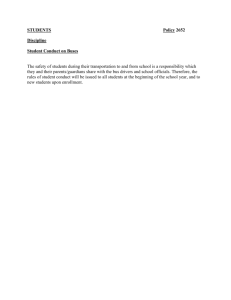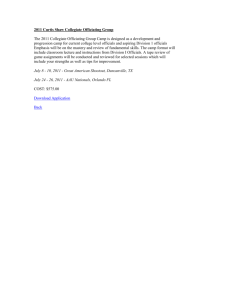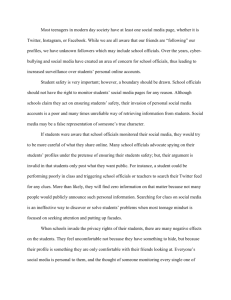Investigating Official Corruption
advertisement
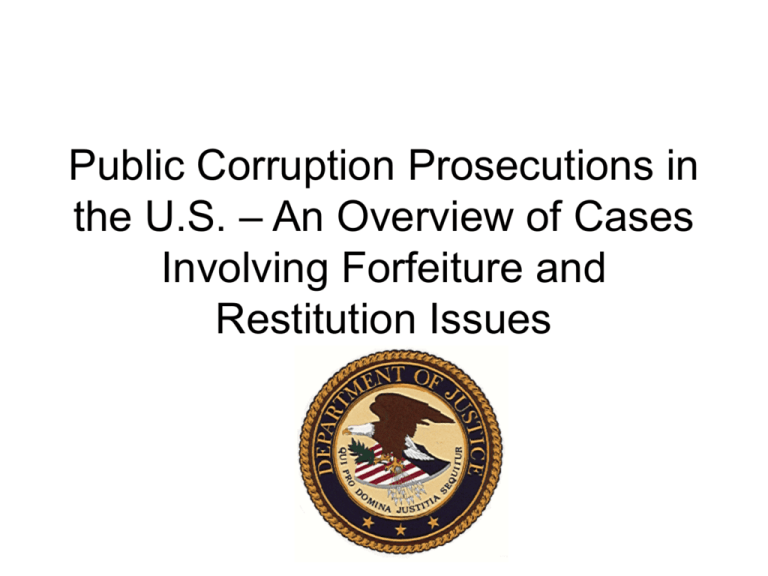
Public Corruption Prosecutions in the U.S. – An Overview of Cases Involving Forfeiture and Restitution Issues U.S. federal prosecutors prosecute crimes by gov’t officials at all levels • Local officials like mayors and city or county commissioners and state prosecutors and police officers • State officials like governors, members of state legislatures, state officials like election officials and cabinet officials like tax officials and state police officers • Federal officials – Federal judicial corruption – U.S. Congressmen and Senators or staff members – Federal contracting officers – Intelligence officials – Cabinet Secretaries – State Department officials involved in immigration visas Statutes Used to Prosecute Official Corruption • • • • • • Bribery and honest services fraud Money laundering Conspiracy to commit federal crimes RICO – federal and state law predicates Income tax evasion and false returns False statements and omissions and False disclosures – Financial Disclosure statements – Campaign reports – False statements to investigators and to congress Importance of Restitution and Forfeiture Tools • Disgorge profits • Deter • Punish For most corruption cases, the things of value given are small • • • • • Trips--foreign and domestic Expensive watches Free home improvements Golf, meals and entertainment Cash – – – – – direct payments payments of mortgages and bills and sales at inflated values payments to trusted courthouse employees jobs for family members and friends • Lobbyists contracts for family and friends • “event coordinators” or public relations businesses – “consulting fees” for gov’t officials allowed to have income outside • Judicial corruption – Typically numerous small bribes • Local police – Typically numerous small bribes or – Excessive force or other civil rights violations – Sexual misconduct • Mayors and City officials – Typically small cash payments, improvements to houses, “little show” jobs • Federal judges, prosecutors or cabinet or agency officials – Relatively rare – False disclosures or conflicts of interest – Voucher fraud • Other Federal officials – Contracting officers – • future employment or family members employment • Sometimes cash or having bills paid directly Exceptions • Jack Abramoff and Michael Scanlon • U.S. Congressman Randy “Duke” Cunningham • U.S. gov’t officials in Iraq involved in Iraq reconstruction contracts • Some officials who sell national security information • Narcotics-related corruption – – Criminal Law and immigration enforcement officers Who investigates? Who prosecutes? • By Department of Justice policy, Trial Attorneys who report to the Attorney General and the investigative agencies • By Department of Justice policy, Special Counsel appointed by the Attorney General and the investigative agencies • By statute, independent counsel appointed by the Court and the investigative agencies Jack Abramoff Jack Abramoff • Following guilty plea of business partner Michael Scanlon, pleaded guilty in Washington, D.C. in Jan 2006 to – conspiracy to commit • Honest services fraud and bribery • Defrauding clients by mail and wires (phones and emails) • Concealment – Defrauding clients • Failing to disclose that he would recent 50 percent of profits of company he recommended to his clients to provide “grass roots services” – Tax evasion • Unreported income and • Improper deductions Jack Abramoff • Also pled guilty in Jan. 2006 in federal court in Miami, FL to bank fraud involving purchase of Sun Cruz Casino • Sentenced in March 2006 to 60 months in prison • Ordered to pay $19 million in restitution to the banks • Surrender date continued while he cooperates • On charges pending in Washington, D.C. faces – prison of up to 91/2 to 11 years which will likely be served concurrently; – restitution payments to his clients of $25 million; – restitution to IRS of approx. $1.8 Million • How can the gov’t recover the $47 million from Abramoff? – Joint and several liability with co-conspirators – Non-dischargeable in bankruptcy – Can be collected at any time in his lifetime Restitution • For defrauding his clients - will be treated as restitution to client - victims who were defrauded administered by the court and probation • For his corruption crimes – not ordered but not likely to be large as to any individual recipient Effects of Abramoff and Scanlon Guilty Pleas so far • On-going criminal investigations – March 2006 Guilty Plea of Tony Rudy, former lobbyist and Deputy chief of staff of House Majority Whip Tom DeLay – U.S. V. Safavian, USDC • Voluntary return of campaign contributions from Abramoff • Amended FEC filings to report in-kind contributions and reimbursement of expenses for use of Abramoff’s luxury sports boxes for fundraisers Cong. Randy “Duke” Cunningham from California – $2.43 million from 3 business operators seeking defense department contracts • Huge profits on a house and a boat, a Rolls Royce, rugs, furniture, cash, meals, travel expenses, and more Cunningham Forfeiture • As part of his plea agreement – Pleaded guilty to tax evasion and bribery conspiracy – Agreed to cooperate in other corruption investigations and investigations of people he admitted publicly bribed him – Agreed to forfeit certain assets which are being sold • public auctions or • public sales • Was sentenced in March 2006 to 8 years and 4 months – prosecutors asked for 10 years – Defense argued prior war service, alcoholism and depression Developments in the on-going Cunningham investigation so far • Mitch Wade, one of the bribe payers, has plead guilty to bribery and is cooperating with federal prosecutors in Washington, D.C.

